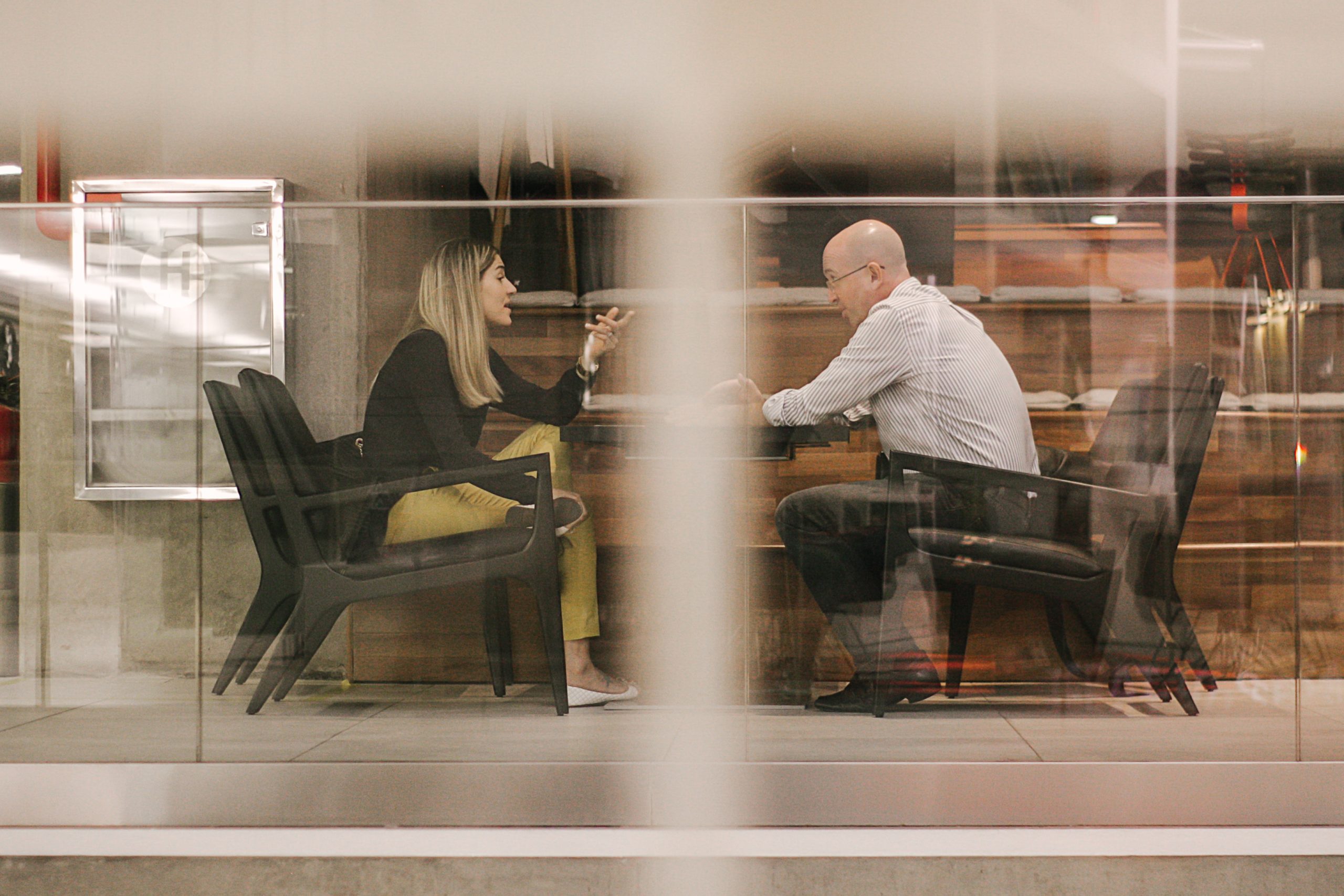International mentoring - how it works and why it is valuable

Our lives are becoming increasingly complex: Choices, challenges, and constant change demand a lot of a person. Mentoring can help to see a personal path more clearly and to grow healthily both as a person as well as a professional.
Senior Partner and Global Managing Director, Mike Cearley, who is based in Texas, USA, has been the mentor of Stefanie Soehnchen, Vice President Digital Strategy in Germany for over a year now. In this interview, they share what a mentor-mentee-journey can look like.
Network with Stefanie Soehnchen and Mike Cearley on LinkedIn.
When does mentoring make sense? What can it look like – especially in the middle of the pandemic?
Stefanie: “Employees who join a company benefit particularly from a mentoring program – especially in the middle of the pandemic. Meeting and connecting with a mentor helps through the starting time, quickly find your way around the company, and connect with key colleagues.”
Mike: “Mentoring makes sense all the time, particularly in times of transition and/or stress – like in the middle of a Global pandemic or when people start a new job, as was the case when Stefanie and I were originally connected.
In general, though, I just think the people part of any job is the most important. If people feel taken care of, supported, heard, understood, like someone cares, they’re going to be in a spot to give their most to the work, which benefits the teams they’re working on and ultimately the work.
If we want to deliver great work, I really believe we need to deliver a great support system and experience to our people. Mentoring is one of the ways we can do that, so I always jump at the chance to mentor and lean into this aspect of my responsibilities.”
What do mentor and mentee get out of it?
Stefanie: “A (video) meeting with the mentor is a moment to reflect, to get a new perspective, to get some answers and to grow. It can help to feel yourself anchored in your work and in the company.”
Mike: “Well, there’s continual growth and development all the way around, for both people. It’s just as fulfilling to me, serving as a mentor, than it is to the other person. I learn through them. I learn from them. I gain the perspective of them, what they’re experiencing, feeling, going through, and yes, this gives me a greater understanding to the different ways I can help them, but it helps me grow as a person, too. It helps me be more selfless, more empathetic, and the beauty is that it flows to all the other aspects of my life.”
What can both mentoring participants learn in the process? What have you learned personally?
Stefanie: “A Mentor can give advice and also his opinion on things the mentee was working on. He or she supports the mentee both on a personal, as well as on a professional level.
For example, I have learned how to make choices, how the agency is structured and how it works. And also how to be a better, more level-headed teammate.”
Mike: “In general, one of the biggest things I’ve learned personally is the importance of taking the focus off of myself. If I can just offer myself as focused, present, and alleviate the distractions, I can be the best support the other person needs at that time.
Specific to my connection with Stefanie, she has taught me a number of things. One of the biggest is simply to be open and vulnerable. She comes to every conversation with questions, thoughts, and real challenges – no matter how big or small – that she’s dealing with. From working through challenges with her teammates and superiors, to the best ways to start to grow business, to establishing meaningful relationships with clients – to talk openly about any of these and seek advice takes some humbleness, a willingness to say, “I don’t have all the answers,” and probably most importantly, an openness to new ideas and wisdom.”
What were important moments / questions?
Stefanie: “A mentor should have the skill to understand, what the mentee needs to hear. He or she should make the person on the other side feel seen and heard and appreciated. To me, the most important moment was our last call before Christmas in 2020.
There were some tough things going through my mind — I had lots of questions and insecurities, heightened by the pandemic situation and the year that lay behind me. Mike sensed that.”
Mike: “There have been so many, honestly. One that comes to mind is when Stefanie started at FH. She proactively reached out to me to have a meeting and came to that meeting with a desire to learn. I think one of the first things she said to me was, “I want to learn from you.” Right off the bat, not knowing me at all, but seeking guidance from someone she wanted to be connected to. I think that takes a lot of courage, not to mention, just saying so much about Stefanie and the type of person she is. There have also been multiple times where we’ve talked about breaking through to teammates, establishing trust, and building a connection there, which I think is a continual struggle in a work environment, particularly when we aren’t together in person on a daily basis.
But in general, I just approach this opportunity with the mindset that any moment that is important for the mentee is the most important moment for me, whatever it is. Which makes it critical for me that I am present, in the moment, so I can respect it and see it for what it is and pour everything I can into it.”
How does the mentoring contribute to better collaboration?
Stefanie: “When a mentor knows many people, he or she can connect the mentee with colleagues within the company to help with quests and questions.”
Mike: “I think at the heart of this is trust. If people trust each other, and even deeper, know someone on the other end cares, they are more apt to be generous of themselves, contribute in all the ways they can, and if they have regular touchpoints throughout their experience where they feel this – that people care, that they will support in any way – it just creates a sense of safety and even desire to be connected to people, and one of the byproducts of that shows up in the way everyone works with one another.”
What were concrete outcomes in your mentoring journey?
Stefanie: “For about a year, we have an EMEA digital leadership call once a month that is based on Mike’s connecting me with others.
Also, we now have a more intuitive product structure in the digital team that is based on Mike’s input. Most importantly, however, is that Mike’s advice has made me a better colleague and a better team lead, I believe.”
Mike: “Well, the biggest outcome is to now have a foundation of a trusting relationship where conversations are safe, counsel is productive, and we both feel and see growth. But more specifically, I’ve seen Stefanie grow her team, break down barriers within the office and account teams, create and sell in new products and additional work, and she’s connected all of the digital/social leaders in FH across EMEA, which has increased collaboration across the region and made meaningful connections with her peers.”
Who would you recommend mentoring and why?
Stefanie: “I’d advise anyone to find mentors – this kind of relationship is one of the most enriching on so many levels, I feel. It allows you to build a trusted space with someone who can give you guidance on how to become, who you want to be.
It isn’t easy to find the right mentor, though. Therefore, be clear what you want and look for someone where the chemistry is right.”
Mike: “We all need people in our lives that we can learn from. It makes us better in all the ways. Seek them out, even outside of work. Different perspectives and wisdom help us consider and discern better.
And beyond that, relationships form that are enduring.”
How to approach mentoring for yourself:
- Have a clear idea what you want to learn / in which areas you want to grow. Do you have a topical focus or a personal growth focus, or both? It is really helpful to define some general goals and hopes for the relationship before you start.
- Take a moment to research and observe. Have a look around internally in your company, but also externally on LinkedIn, who feels like someone you’d want and could learn from. As with most relationships, it can really help to have good chemistry and similar values to build trust and guarantee openness and understanding.
- Don’t be shy. As a mentoring relationship usually helps both parties to grow, many people are open to being a mentor. So, don’t be scared to ask the person you would like to be your mentor for their help. Remember: You’ve got a “No” already, you can get a “Yes” if you ask.
- Think about what you bring to the table. When approaching a mentor, this might be a helpful way to start a proposition: Tell them why you’d like to learn from them and also what your expertise and skills are. Many senior leadership people are interested in diverse and young perspectives to help them with their own work.
- Suggest a structure. If you have an idea of how often to meet where and how to maybe structure the meetings, it might be nice to define that together from the get-go. This way, both sides can judge if they can live up to the expectations and are willing to commit to working together long term.
For business-relevant communication content like this, why not sign up for our newsletter “FleishmanHillard Quarterly”, follow FleishmanHillard Germany on LinkedIn or Twitter, get to know our team on Instagram or visit our YouTube channel.
Find Out More
-
Why we tell the truth
May 23, 2022


